-
San Francisco International Film Festival 2016
Last edited by Chris Knipp; 04-24-2016 at 10:37 AM.
-
COUNTING (Jem Cohen 2015)
JEM COHEN: COUNTING(2015)
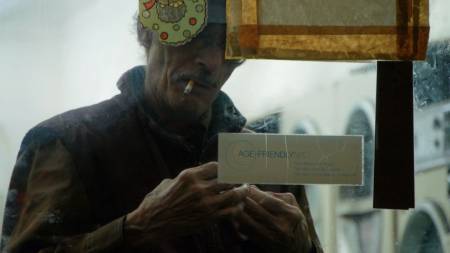
A man with a camera roaming the world
kids just out of school.
Someone behind a sign
on a cell phone.
Men gathering cardboard from the street.
Shopkeepers.
These captions appear together an hour and a half through Jem Cohen's new documentary, which is divided into 15 segments of different lengths. This time after the more linear Chain and Museum Hours, which had discernible characters, relationships, and linking locations, this returns to his more abstract and purely observational roots. The lines above might seem random, though, but obviously chronicle the palpitating street life of a city. He ranges from his home base New York to Moscow, St. Petersburg, Istanbul, and places in between. As an anonymous urban voyeur with a camera myself, a still camera in my case, I can see early on in a series of shots and sounds Cohen captured in the New York subway (a recent subject of mine) how experienced, steady, bold and brave he is, what a good eye and what a good camera he's got.
The focus is generally urban. Some may think, like the excellent Ann Hornaday of The Washington Post, that Counting is about "mortality, globalism, jet lag, personal loss and the dialectical tug of war between the built and natural environment." If you travel so far across the world and focus on cities, these topics will appear, most like. This being sound and movement as well as image, Cohen chooses to introduce "protest" as an aspect of city life, and Manohla Dargis of the NY Times, in her review, calls that a "leitmotif" of this film and goes so far as to say "it’s easy to see the entire movie — with its insistence on ordinary beauty and its undertow of leftist politics — as an act of resistance." Indeed sometimes the voices on the soundtrack literally are in protest: chants of "I can't breathe" against a notorious recent New York police murder of an African American; there are references to "Occupy," and objections (in English) to shutting down a last open space for political demonstrations in Istanbul. At other moments we hear in the background sounds of a Congressional hearing about NSA spying, and see Cohen's own shots of spy cameras placed high above a city street, though often he is being a voyeur himself.
But there are just beautiful photographs, cool digital yellows, a dog standing stock still, cats, possible riffs off Chris Marker, the kind of thing that arouses the ire of the Slant's irascible Clayton Dillard, who thinks Marker's way better (he probably is) and protests that what he calls Cohen's "poetic pretenses" are "compounded by a sledgehammer insistence on elusive and irreducible moments as inherently beautiful." Oh dear. Well, he may have a point: not every bit of detritus in the film is beautiful, but I'm not sure Cohen is insisting that it is. Clearly this kind of filmmaking, while it lacks the lulling, repetitious kind of beauty (and crowd-pleasing kitsch) of visual poems like Koyaanisqatsi, isn't slick and dazzling like that, and is more intimate and personal, can annoy people in a different way, or just bore them.
Cohen is now 53 and this may be a summation of the kind of film he's been honing for years, the best way he can express all he sees and knows. So it's a balance of didactic and neutral, "observational" in two senses. Or as Hornaday puts it, the film "unspools as a sort of manifesto" but Cohen is "far too subtle and committed to open readings" to say so. So each of us must decide what it's a manifesto about (which again may irritate some viewers) or maybe we can decide it's not about anything that can be named.
Counting is a mirror for viewers or critics. Oddly, though reviewers find so much in this film, they don't seem to think much about what kind of person would make it. Despite his references to busy urban life and to organized protests, he seems to me the classic "silent traveler" type, anonymous, reserved, sly, unobtrusive. He's the very opposite of Michael Moore; the opposite of Chris Marker too, despite his possible debt to Marker, because Marker's lengthy commentary is absent. He gives us an insight into his secret self. This is not a diary, but it is. It ends with a line from Chris Marker, "In this layman's double for prayer that we call memory." Before that, he begins shifting among images more rapidly, from a neon-drenched Middle Eastern city with calls to prayer and signage in Arabic (Sharjah), to New York cabs, a ravaged pay phone, back to minarets and fluttering videotape, so we might be flickering about in his mind. At one point we hear Cohen receive a phone call informing him of his mother's stroke. But mostly he is delighting in the wonder and energy of urban life -- and decay. Maybe next time he'll return to particular people and relationships, but this is probably, for him, the most expansive and personal medium of expression open to him, and it is open to him as to few others.
Counting, 111 mins., debuted at Berlin 9 Feb. 2015; seven other festival showings, latest San Francisco, where it was screened for this review. US theatrical release 31 July 2015. Also shown in the National Gallery in DC in Dec. 2015, hence Ann Hornaday's review. This has a rich sound design as well as precise imagers and has live music. Patti Smit is one of the producers. TRAILER. London had a Jem Cohen season from March to May 2015 at the Barbican, Whitechapel Gallery, and Hackney Picturehouse: see this Guardian article.
Last edited by Chris Knipp; 04-02-2016 at 06:38 PM.
-
FROM AFAR/DESDE ALLÁ (Lorenzo Vigas 2015)
LORENZO VIGAS: FROM AFAR/DESDE ALLÁ (2015)
Preview - full review will appear later.
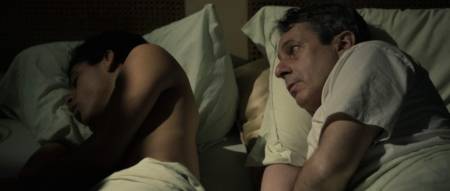
LUIS SILVA AND ALFREDO CASTRO IN FROM AFAR
Power trips
Lorenzo Vigas' subtle and powerful first film reminded me of what Graham Greene said of Patricia Highsmith's writng: she "has created a world of her own – a world claustrophobic and irrational which we enter each time with a sense of personal danger." Alfredo Castro, who starred in Pablo Larraín's Tony Manero and Post Mortem, is the ideal guide into a world of morally suspect creepiness -- and danger. It turns out young Luis Silva is an ideal companion for the trip. LIke Robin Campillo's Eastern Boys, about a middle class gay Frenchman who enters into a relationship with a young Checnean refugee he picks up in Paris' Gare du Nord, Armando walks, willingly, into personal danger when he lures a hostile and poor youth in Caracas to his respectable home.
Everything comes together here, directorial control and tense pacing, ideal casting and cinematography, a seamless use of locations, above all the story. Though this is by Iñárritu's former writer Guillermo Arriaga and has hints of Amores Perros-levels of danger and violence, thre's no unnecessary symbolism here: it's just straight, compulsively-watchable action -- an amazing debut.
(The director's full name is Lorenzo Vigas Castes.)
From Afar/Desde allá, 93 mins, debuted at Venice 10 Sept. 2015;, winning the Golden Lion for best picture; 10 other awards and nominations and 18 other festivals including Toronto, London, Miami and Hong Kong. French theatrical release 4 May 2016, US (NYC, Strand) 8 June. Full review will appear here then.
TRAILER.
Last edited by Chris Knipp; 04-03-2016 at 11:54 PM.
-
THE INNOCENTS (Anne Fontaine 2016)
ANNE FONTAINE: THE INNOCENTS/LES INNOCENTES (2016)
Preview - full review will appear later.
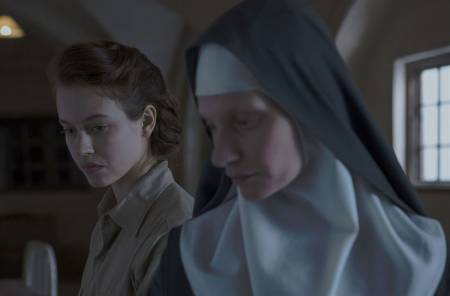
LOU DE LAÂGE AND AGATA BUZEK IN THE INNOCENTS
A story of pregnant nuns after World War II
There isn't much violence till forty minutes into Anne Fontaine's film, when the French Red Cross doctor Mathilde Beaulieu (Lou de Laâge of Breathe) is stopped by Russian soldiers, thrown down, and is on the point of being raped when she's rescued by a Russian officer. But rape by Russian soldiers has happened to dozens of the Polish nuns Mathilde is trying to help, and seven of them have now become pregnant in this film dramatizing actual events in Poland in December 1945 after the end of the War when real-life doctor Madeleine Pauliac braved personal danger and religious objections to save just such a situation. The Benedictine nuns, who are not supposed to show their bodies or be touched, face scandal that might destroy their order if events are disclosed. Mathilde is joined in the effort by Samuel (a less wispy than usual Vincent Macaigne), a French doctor. The context is complicated by the fact that Samuel is Jewish, the new Polish communist government isn't friendly to religious orders, and Mathilde herself is a strongly free-thinking daughter of leftists.
The Innocents/Les innocentes, 115 mins., debuted at Sundance where it was reviewed in Variety by Justin Chang, who called it "her best film in years." (It was then entitled Agnes Dei.) Released in France 10 Feb. 2016, with enthusiastic critical reception (AlloCiné press rating 3.9/24 reviews; viewers' rating 4.1). It has been acquired by Picturehouse. Adèle Haenel was originally attached to play Mathilde. Shown in the San Francisco International Film Festival, where it was screened for this review. US theatrical release begins 1 July 2016; San Francisco Bay Area 8 July.
Last edited by Chris Knipp; 06-22-2016 at 05:46 PM.
-
THE EVENT/SOBYTIE (Sergei Loznitsa 2015)
THE EVENT/SOBYTIE (Sergei Loznitsa 2015)
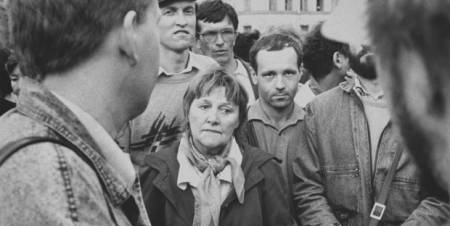
Waiting for democracy that never comes
Sergei Loznitsa is a Russian documentary filmmaker who reached greatest festival currency through two recent fiction features: his violently arresting but ultimately incoherent road picture My Joy (NYFF 2010) and his moody content-light 1942 occupation drama In the Fog (SFIFF 2012). Here, in The Event, he returns to documentary with a collection, at once momentous and opaque (there is no narration) of archival found-footage from the August 1991 coup d'état attempt or putsch that ended the Soviet regime assembled from materials supplied by the Saint Petersburg Documentary Film Studio.
From the start we hear the strains of Tchaikovsky's "Swan Lake" because that was what played on the interrupted state-owned TV and radio channels instead of news broadcasts at this time. It heightens our sense of the mystification or obliviousness of the Russian public whose faces we see gathered around in Leningrad, shot by eight different roving cameras that move among them and look down on them. This is material that is immensely suggestive and atmospheric, but what it means depends on what you bring to it. Loznitsa provides no background knowledge, such as that the tipping point was a planned August 20th treaty signing away a lot of Moscow's centralized power to the individual states. A group including the VP, premier, KGB head and Defense Minister calling itself the General Committee on the State Emergency had taken over to prevent this, and put Gorbachev under state arrest.
The footage that unreels was shot in the aftermath that left things is a state of flux for three days. Protestors gathered around Moscow's White House to defend the stronghold of democratic opposition led by Boris Yeltsin, the president of Russia. Gorbachev, president of the USSR is in his dacha in the Crimea and being reported too sick to rule. The people are seen in very consistent looking, rather attractive grayish black and white photographic images, lightly dressed for the summer weather, all ages, occasionally young and tanned, standing, perch high, milling about or occasionally marching, some of them setting up barricades to block a possible military takeover or raising signs or banners -- "Down with the putsch! We are all on strike!" and listening to de facto broadcasts on portable radios, scrambling for printed declarations. They are listening to speeches from steps, entrances, or balconies about what is happening, especially during the last of the Emergency Committee's three-day reign, when Leningrad mayor Anatoly Sobchak is heard from. Some wait outside government buildings for news. Thousands gather outside in the big central Palace Square of Leningrad where most of what is on this film takes place.
The events we're watching in these films are at once tumultuous -- there is a sense that 73 years of Soviet rule are coming to an end, and there are chants of "Down with communism!" -- and quiet -- and curiously ambiguous. What is, or will be, the outcome of all this? There is no violence or shouting. The crowds are remarkably well behaved, exhibiting a mixture of apprehension and optimism. There is no repression; hardly a policeman or military officer is in sight. One may think of the Arab Spring of recent years, and the events in Tahrir Square in Cairo. But here there is not the tumult and excitement of Cairo, the shouting and open debate, nor the violence and danger, more the air of watching and listening, waiting to see what is happening. And what is happening, they hardly know. They cheer both for the downfall of the Soviet government and the removal of the lawless stagers of the would-be coup. It's announced that there has been a vote, and the Soviet flag is taken down and the tricolor banner of Russia put in its place. There is talk of "democracy." There are memories of 1917, and of 1964, cited as two momentous, perhaps infamous, times. And Vladimir Putin, now the dictator in charge of post-Soviet Russia, is briefly seen, this time a new member of the Saint Petersburg administration after years working with the KGB. x
Consultation of Russian and Soviet history might help viewers to add more meaning to what they are watching. I have made use of a Wikipedia article on the Brezhnev era and the reviews of the film by Jay Weissberg in Variety and Peter Debruge in Hollywood Reporter, both of whom elucidate this film through their own knowledge and researches. The fact remains that without external knowledge not provided by the film, the film means little. With its blackouts between segments filled by "Swan Lake," the film flows smoothly. Perhaps its most artful editing is a passage near the end where alternating clips make it look like Putin, who's just gotten into a car, may be pursued by police with wailing sirens (or part of a power motorcade?).
The constant flowing movement of the cameras might make one think in passing of a famous Russian film from eleven years later, Sokurov's 2002 single-shotRussian Ark, and there is something haunting and mysterious about these endless, eternally milling crowds.
Loznitsa's 2014 documentary Maidan examined the recent conflict in Ukraine.
The Event/событие (Sobytie), 73 mins., debuted at Venice 2 Sept. 2015, Toronto 15 Sept., theatrical releae in the Netherlands 10 Mar. 2016; SFIFF showing 24 Apr. 2016; screened for this review as part of SFIFF.
Last edited by Chris Knipp; 04-04-2016 at 06:32 PM.
-
THE DEMONS/LES DÉMONS (Philippe Lesage 2015)
PHILIPPE LESAGE: THE DEMONS/LES DÉMONS (2015)
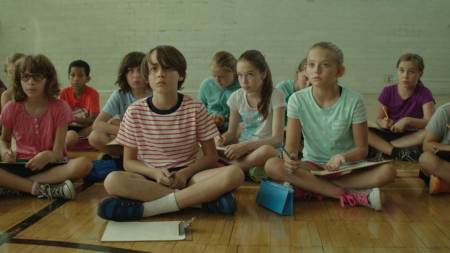
ÉDOUARD TRREMBLAY-GRENIER (CENTER) IN THE DEMONS
Haneke lite
French Canada has produced a notable new cinematic talent in the person of documentary-trained director Philippe Lesage, whose second feature (but the first to be shown) is a stunning, original display of the horrors and beauties of everyday life as experienced by ten-year-old Félix (Édouard Tremblay-Grenier), youngest of three in a comfortable Montreal family. Lesage makes skillful use of the era when he was growing up, when AIDS was a new terror, kids didn't have cell phones for easy contact with parents, and you couldn't check up on things on the Internet. He also makes use of an unusual circular structure, where things turn from pleasant to to awful and back to pleasant again, which is hard to take, but still works. He also works well with the sunny, candy-colored images and dramatic depth of field produced by his cinematographer, Nicolas Canniccioni; and with iconic music ranging from Bach to Robert Johnson blues to Sibelius to Miriam Makeba.
Félix's soft face and well-cut mop of hair suggest a comfortable background, and he's much loved by his two older siblings, François (Vassali Schneider) and sister Emmanuelle (Sarah Mottet). But there are plenty of complications. He's in love with his young gym teacher Rébecca (Victoria Diamond). He's afraid his parents may be breaking up. Sex play with a boy and a story heard in class make him fear he's got AIDS. There are horrible fake tales told by an older boy of things happening to neighbor children and there really are kidnappings and disappearances of kids. Félix is sensitive and gets afraid at night sometimes, and he seems to get chosen last for teams.
The way Lesage shows Félix sliding down a stairwell to eavesdrop on adults at night, and then climbing upside down around on the sofa later investigating what they were doing, speaks volumes in child-awareness. Canniccioni's long shots and shallow focus subtly combine a sense of intimacy and a sense of powerlessness. The film's excellence at depicting group action is key to our sense of this combination. As Guy Lodge observes in his Variety review, Lesage shrewdly avoids first-person point of view, "however intimate the film’s sense of a character’s inner workings."
This makes possible a leap midway in the film's two hours, when Lesage takes a big chance by not only delivering real horror awfully late, but switching to another, older character. This is a passage that is not only beyond repugnant and disturbing, but may seem off-topic. But it works, because the character has already been integrated so thoroughly into events -- with cruel irony, though a predator, his job puts him close to the kids -- and in the way things return neatly to the everyday and to Félix thereafter. And it's all rounded by bobbing figures, early and late, accompanied by Bach's "St. Matthew's Passion" -- a visual and musical rhythm that's genius and that I won't forget. Nor will I forget Félix and his siblings struggling from room to room in the house trying to stop their parents (Laurent Lucas, Pascale Bussières) from having a terrible row; or a pretty, abstract, nightmare carnival; nor a forest treasure hunt. Lesage melds some memorable narrative turns with a distinctive style, look, sound, and pace.
Lesage's slow buildup of dread suggests Michael Haneke. Jonathan Holland in Hollywood Reporter points out the Canadian creates "a sense of uneasy disturbance much as Michael Haneke does, simply by watching implacably and waiting for carefully chosen details to flicker out and betray the truth." He suggests "this might indeed be a companion piece to Haneke’s study of the seeds of fascist evil, The White Ribbon" (though Lesage is working in a brighter, more pastel palette; indeed Guy Lodge says Lesage's balance of "good-humored humanism with a formal sangfroid" is "suggestive of a summer-brightened Haneke"). Well, if serious comparisons with Haneke are in order, we may have a formidable new talent on our hands.
The Demons/Les Démons, 118 mins., debuted at San Sebastian Sept. 2015. Theatrical release in Canada in Oct. 2015; coming in France 14 Sept. 2016. Five other festivals, including San Francisco (28 Apr. 2016), where it was screened for this review.
Last edited by Chris Knipp; 04-22-2016 at 01:15 AM.
 Posting Permissions
Posting Permissions
- You may not post new threads
- You may not post replies
- You may not post attachments
- You may not edit your posts
-
Forum Rules
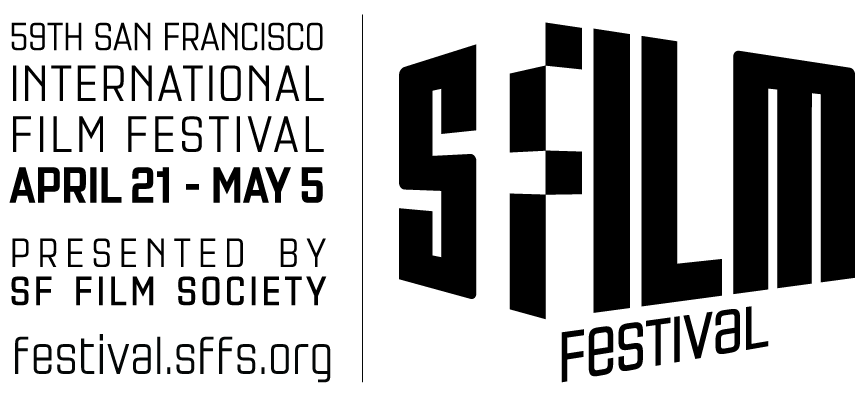




 Reply With Quote
Reply With Quote





Bookmarks